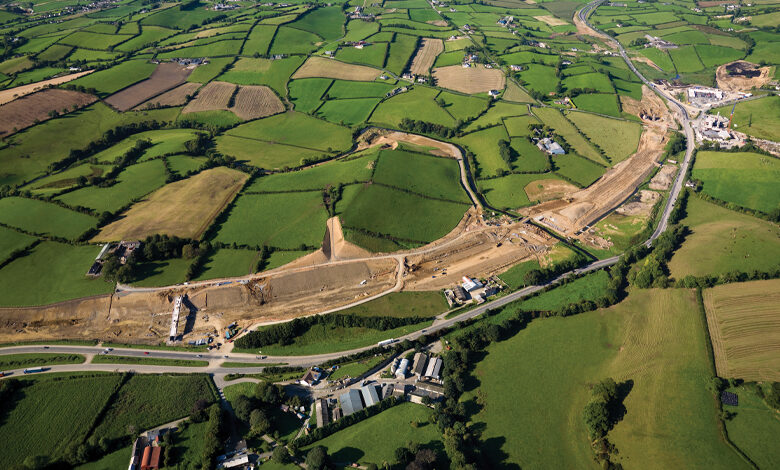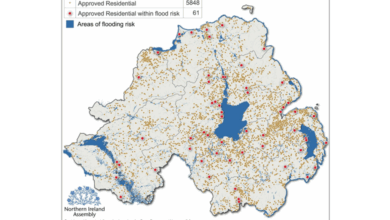Infrastructure 2050

A critical investment strategy has made little to no progress since it was released in draft form in January 2022, prior to the collapse of the Northern Ireland Executive.
Published by the Executive Office, Infrastructure 2050 – draft Investment Strategy for Northern Ireland was opened for consultations which were supposed to close in April 2022, with a final strategy to be agreed towards the end of 2022.
However, since the Executive currently has no political leadership and is not functional, no progress has been made with the Executive Office website still stating that the draft strategy is open for submissions, and that the deadline for submissions is 20 April 2022 – almost one year prior to the publication of this article.
Upon the prospective reformation of an Executive, it is not clear whether the consultations process will re-open. Furthermore, there is the prospect of direct rule, with Secretary of State Chris Heaton-Harris MP having already taken the step of setting a budget for Northern Ireland, although this budget will only fund existing projects which have already been signed off by prior executives.
Central to the challenge pending the future formation of an Executive will be the implementation of the Medium-Term Infrastructure Finance Plan outlined as part of the strategy as, in the draft document’s own words: “Long-term investment planning has been hampered by immediate-term (one- to three-year) budget settlements.”
The strategy itself has five objectives: Cutting emissions; strengthening essential services; making Northern Ireland more competitive; making Northern Ireland’s towns and villages nicer places to live; and making the most of new technology.
Strengthening water services
The draft report acknowledges the inefficiency in Northern Ireland’s wastewater services, with more than 70 per cent of the infrastructure in Northern Ireland to deal with wastewater treatment serving only 10 per cent of the population.
“Across the region, some of our combined wastewater plants that collect rainwater runoff, domestic sewage and industrial wastewater into one pipe are nearing or at capacity – especially at times of high demand due to adverse weather,” the report states.
It continues: “This is now acting as a brake on the planned development of the new homes and businesses we need. The lack of wastewater treatment capacity has also resulted in an excess of small legacy treatment works, often developed privately to enable small-scale housing developments to proceed.”
To solve Northern Ireland’s ailing infrastructure, the report explains that “we will need other essential infrastructure such as public transport and water and wastewater facilities to be fit for purpose”.
“This will require a more collaborative and joined-up approach to planning and investment to avoid sub-optimal or ad hoc outcomes.”
A new transport network
In the Republic, Environment Minister Eamon Ryan has been a proponent of the 15-minute city model as a means of cutting the number of journeys taken by the average citizen, with the potential benefits of cutting emissions, increasing efficiency in the transport system, and making work accessible for citizens.
Likewise, when the draft Investment Strategy was published, it too proposed a similar model to be brought into more widespread use in Northern Ireland, in addition to expanding the use of electric vehicles in Northern Ireland.
“We need to cut the number of journeys we take, and make sure more of the trips we do take are by public transport or ‘active travel’ – namely, walking or cycling.
“Also, over 40 per cent of vehicles will need to be electric by 2035 if we are to meet our emissions targets. So, we will invest in charging stations and battery recycling, and encourage drivers to switch to alternative fuels.”
Currently, Northern Ireland has 11,476 electric vehicles registered on the roads, less than half the per capita rate in the Republic.
Making Northern Ireland competitive
Already characterised as a recognised leader in many specialist areas such as cybersecurity, data analytics, life and health sciences, and fintech, Northern Ireland has the potential to be Europe’s leading foreign direct investment destination for new software development.
The report balances these promising features of the Northern Ireland economy by outlining that the region “suffers from poor productivity, relatively low wages, with too many lacking high-level skills or in need of reskilling; high rates of economic inactivity; and relatively low levels of investment in research, development and innovation”.
Despite the recognition of Northern Ireland’s lagging infrastructure and subsequent economic stagnation, backed up by a strategy which gained political support which will likely ensure if an Executive is formed again in the future, the implementation of the Investment Strategy is entirely dependent on the reformation of an Executive, with deadlines for consultations and implementation having already been missed.





